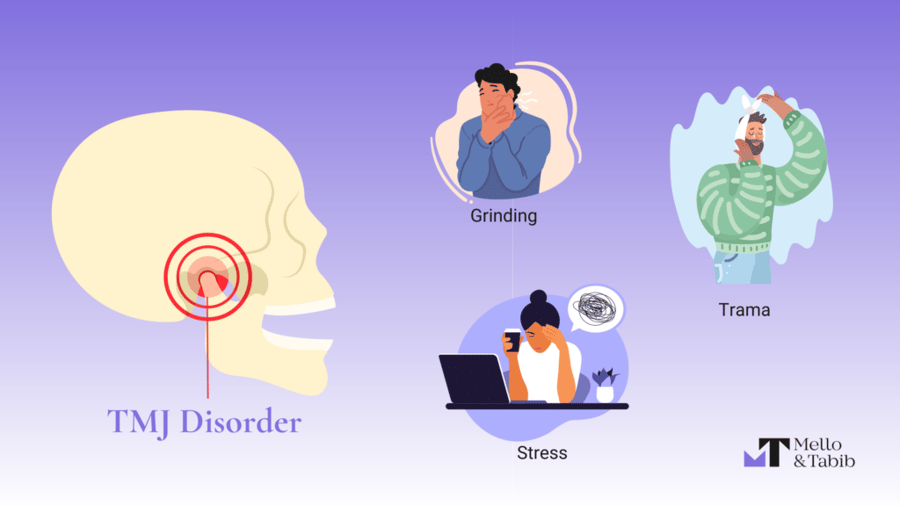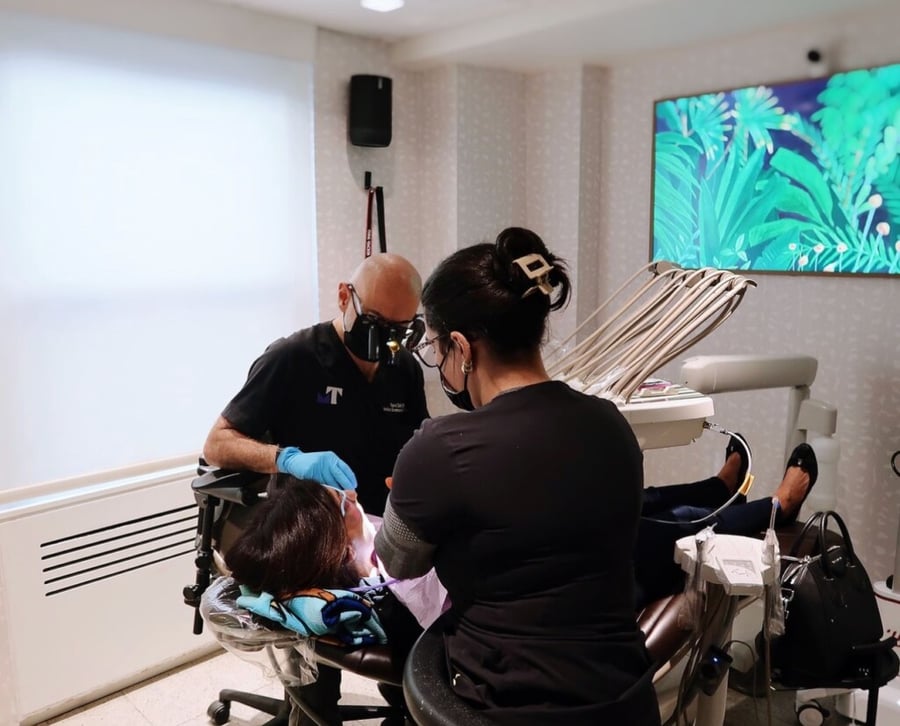
Temporomandibular Joint (TMJ) disorder is a condition that affects countless individuals, yet it’s often misunderstood or misdiagnosed. It can manifest a wide range of symptoms that go beyond just jaw pain. Understanding TMJ disorder is the first step towards getting the proper care and relief you need.
At NYC Smile Design, we’ve seen firsthand the impact that TMJ disorder can have on our patients’ daily lives—from persistent jaw discomfort to the less obvious symptoms that can be just as debilitating. We understand that living with this condition means more than just managing pain; it’s about regaining the quality of life that comes with a healthy, functioning jaw.
This blog focuses on what TMJ disorder is, highlights the common symptoms, and guides you on when to seek professional evaluation. If you’re someone who suspects they may be experiencing symptoms related to TMJ disorder, this read is for you.
Unveiling the Mystery of TMJ
Before diving into the symptoms, let’s unravel the basics of the TMJ. The temporomandibular joints are the hinges that connect your jaw to the temporal bones of your skull, located in front of each ear. They allow you to move your jaw up and down and side to side, enabling you to talk, chew, and yawn.

The Complexity of TMJ Disorder
TMJ disorder encompasses a complex set of conditions that can cause pain in your jaw joint and the muscles that control jaw movement. It’s not always clear what causes TMJ disorders. The pain may be due to a combination of factors, like genetics, arthritis, or jaw injury. Some people who have jaw pain also tend to clench or grind their teeth (bruxism), although many people habitually clench their teeth and never develop TMJ disorders.
Recognizing the Symptoms of TMJ Disorder
Identifying TMJ disorder can be challenging because the symptoms vary and can mimic other conditions. Here are common signs that may indicate a TMJ disorder:
Jaw Pain or Tenderness
One of the most common symptoms is pain in the jaw joint area, face, and neck. It might be present at rest or can intensify while you’re talking, chewing, or opening your mouth wide. This discomfort can be more than just an annoyance; it can be a sign that something is not right with how your jaw joints are functioning. The pain often centers around the jaw joint itself but can radiate out to include your face and neck. It can vary in intensity, sometimes feeling like a dull ache that’s always there, even when you’re not moving your mouth. Other times, it might flare up and become sharper when you’re doing everyday things like talking to your friends, enjoying your favorite meal, or even simply yawning.
Audible Jaw Clicking or Popping Sounds
Hearing a clicking or popping sound when opening or closing your mouth can be a sign of TMJ disorder. It’s important to note that if there’s no pain or limitation of movement associated with your jaw clicking, you probably don’t need treatment for a TMJ disorder.
Difficulty or Discomfort While Chewing
Chewing should be a simple, everyday action, but for those with TMJ disorder, it can become a challenge. If you’re finding it tough to chew your food, or if every bite brings a sense of discomfort, it’s not something to brush off. These symptoms can indicate that your jaw is not aligning as it should, which is a common issue with TMJ disorder. It might feel like your teeth suddenly don’t match up anymore, making your once comfortable bite feel awkward and misaligned.
This discomfort can disrupt your enjoyment of meals and may even lead to avoiding certain foods that make the problem worse. If you’re noticing these changes, it’s a signal from your body that something’s off with your jaw’s mechanics. While it might be tempting to wait and see if it gets better on its own, it’s wise to address these symptoms early. A dental professional can assess your bite and help determine if TMJ disorder is the root cause, guiding you toward the right treatment to alleviate your discomfort.
Locking of the Joint
If you’ve ever experienced your jaw getting stuck or locked when you open or close your mouth, it’s more than just a temporary inconvenience—it could be a sign of TMJ disorder. This locking can be a startling and often painful experience, significantly hindering basic daily activities like eating and speaking. When your jaw refuses to move freely, it’s a clear signal that the intricate workings of your jaw joint may be compromised, necessitating a professional evaluation to address the underlying issue and restore normal function.
Headaches
Among the most telling signs of TMJ disorders are headaches, which can range from acute, chronic, to migraine types. Understanding this connection is crucial for identifying and treating TMJ effectively.
TMJ disorders often lead to acute headaches due to the strain placed on the muscles and joints around the jaw. These headaches can evolve into chronic issues if the underlying TMJ disorder is not addressed. The chronic pain, often misattributed to other causes, can persistently affect the quality of life, emphasizing the importance of early detection and treatment of TMJ disorders.
Migraine headaches, characterized by intense and debilitating pain, can also be a symptom of TMJ disorders. These migraines are often a result of the tension and misalignment in the jaw, leading to nerve compression and triggering severe headaches.

When to Seek Professional Help
Dealing with the discomforts of TMJ disorder can be tough, and figuring out when to get help can be even tougher. If you find that the aches or the trouble with moving your jaw aren’t getting any better after a week, it’s a sign that you should talk to someone who knows a lot about jaws and teeth, like a dentist or a doctor. It’s really important not to just ignore the pain or the difficulty you’re having and hope it will disappear on its own. Remember, getting help early can mean a quicker path to feeling good again and getting back to your regular life without jaw pain getting in the way.
The Role of a Dental Professional in TMJ Disorders
Dental professionals have the expertise to diagnose TMJ disorders. They can assess your symptoms, examine your jaw, listen to and feel your jaw when you open and close your mouth, observe the range of motion in your jaw, and press on areas around your jaw to identify sites of pain or discomfort.
Once diagnosed, they can create a personalized treatment plan which may include pain relievers, anti-inflammatories, muscle relaxants, physical therapy, orthodontic treatment, oral splints or mouth guards, and in some cases, surgical treatments.

Non-Professional Remedies and Management
While awaiting your dental consultation, there are some non-professional remedies you might consider to alleviate the symptoms:
Self-Care Practices
Applying moist heat or cold packs to the affected area, eating soft foods, avoiding extreme jaw movements (like wide yawning, loud singing, and gum chewing), and learning techniques to relax and reduce stress can provide some relief.
Over-the-Counter Solutions
Certain non-prescription medications such as ibuprofen, naproxen, or acetaminophen can offer temporary relief for pain, but they should not be viewed as long-term solutions, especially without a professional assessment.

Understanding and Addressing TMJ Disorder
Recognizing the symptoms of TMJ disorder is the first step toward relief. While the condition is complex, understanding the signs can guide you in making an informed decision about seeking professional help. Remember, the goal is not just to treat TMJ disorder but to regain a comfortable, functional, and pain-free life.
Should you decide that your symptoms align with those associated with TMJ disorder, a professional consultation is the definitive next step. Dental experts like those at NYC Smile Design are equipped to offer the guidance and treatment necessary to manage TMJ disorders effectively.
Facing TMJ symptoms can be daunting, but with the right information and professional support, you can take control of your oral health. Your journey towards a TMJ-free life is a conversation away, and it starts with recognizing the need to speak to a specialist who understands the intricacies of the temporomandibular joint. Remember, you deserve a life free from jaw pain and discomfort, and it begins with awareness and action.
Now that you have better understanding of TMJ and it’s symptoms, take the next step in your journey with our blog, “ What To Expect at your NYC Smile Design Consultation”.
Topics:

